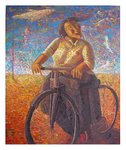生活在西藏,听说逃往的故事实在不是什么新鲜的事。有些故事夸大其词,有些故事让人撕心裂肺。而今天,几个国际登山者展示给我们的逃亡故事,让我迷惑于天灾与人祸? 而廖天琪认为藏人的逃亡是汉人的耻辱。




“While I was up the mountain, pursuing my personal dream, other people were trying to pursue theirs...some 80 tibetan people were trying to cross Nangpa La into Nepal and India to see HH,” reported




On October 1 I heard machine-gun bursts... Chinese militias hunting Tibetans like rats, dogs, rabbits - you name it.” In the image, Sergiu Matei during the approaching trek.
Shots at Nangpa La
“Early morning of September 30th, I walked out of our dining tent to gaze over towards the Nangpa La pass. I saw a line of Tibetans heading towards the start of the pass - a common sight, as the trade routes are open this time of year.”
“Then, without warning, shots rang out. Over, and over and over. Then the line of people started to run uphill – they were at 19,000ft. Apparently the Chinese army was tipped off about their attempted escape, and had showed up with guns.”
2 people were down, and they weren't getting up
“Watching the line snake off through the snow, as the shots rang out, we saw two shapes fall. The binoculars confirmed it: 2 people were down, and they weren't getting up. Then more Chinese army swarmed through ABC.”
According to the climber, Tibetans on the mountain later said that up to seven people might have been shot dead, their bodies then shoved into a crevasse not far from Cho Oyu BC.
A traders, trekkers and refuges route
The wide Nangpa La pass, located between Tibet and Nepal, has been a common traders’ route for centuries. In fact, many among The Sherpa people reached Nepal 400 years ago across this col.
Since the Chinese invasion of Tibet, a large number of refugees added to the yak caravans. Whilst many Tibetans cross the pass in order to sell their traditional craft and Chinese goods in Namche Bazaar’s Saturday market and then come back, some seek refuge in Nepal or India.
The Nangpa La is also open to foreign trekkers.
The fact is, caravans across the Nangpa La are often seen by climbers in Cho Oyu’s ABC, located close by. Tibetan traders cross the pass not only in winter (when no one is watching), but also during the climbing season.
Not the first time
These unregistered travelers have rarely raised attention from the Chinese troops in BC, neither from the Liason Officers always present in ABC. Some climbing teams through the years have however reported on hearing shots. But this is the first time we have first-hand reports of a westerner witnessing people being shot on the way to Nepal’s border.
Nevertheless, it is not the first time such a fact hit the news. Canada’s Tibet Committee reported a similar incident on December 4, 2003: “Last year, there were separate eyewitness reports by Western mountain climbers of Chinese border police firing upon Tibetan refugees as well as pursuing refugees across Nangpa la into Nepal territory,” the NGO’s reported. “In mid October of this year, a group of 34 Tibetan refugees were fired upon by Chinese border security while attempting to cross into Nepal over Nangpa La.”
We ran in all directions
According to the report, one of the refugees who finally made it to Nepal told CTC in Kathmandu: “When the machine gun fire started hitting around us, we ran in all directions,” the 25 year old survivor said. “We ran back where we came from just trying to avoid the army. After hiding from the gun blasts for many hours, we climbed over Nangpa La in the middle of the night and walked the entire day on the Nepal side as we were so scared.”
Approximately 2,500 Tibetans annually escape from Tibet enroute to India, according to the Canada Tibet Committee. Approximately a third of those refugees are children under 18 years who are seeking a Tibetan language education unavailable to them under Chinese rule. Approximately one quarter of the refugees who successfully escape Tibet are monks and nuns who flee due to Chinese repression of religious beliefs and practices.
Nangpa La is situated only a few kilometres west of Cho Oyu (5,716m/18,753ft). The wide, glaciated pass serves as the main trading route between the Tibetans and the Sherpas of Khumbu.
The Nangpa La pass has also been used by “illegal” climbers who have started from Nepal and then crossed the border in order to summit Cho Chu without obtaining a climbing permit. Trespassing mostly happened during off season climbs and in past decades, when Chinese patrols were scarce in the area.






